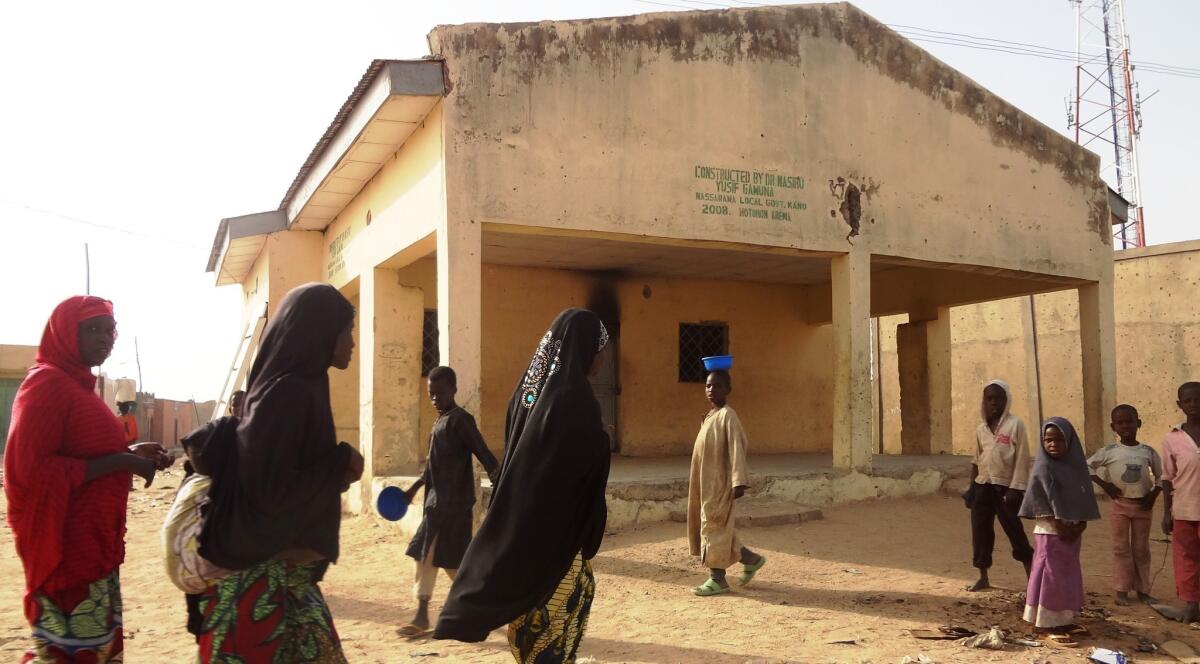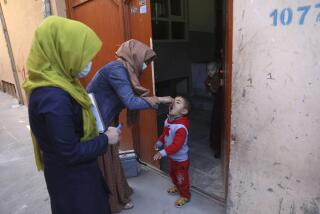Radio journalists in Nigeria accused of spurring slayings

- Share via
Two radio journalists have reportedly been charged in northern Nigeria on suspicion of airing a broadcast that incited the slayings of women vaccinating people against polio. The case centers on a program aired days before the shootings last week.
Police said at least nine immunization workers were killed by gunmen Friday in the northern city of Kano, where suspicion toward vaccines has thwarted the campaign against polio. It is still unclear who was behind the attacks; no arrests have been reported.
After the shootings, Nigerian media reported, three journalists from the Wazobia FM station were detained: a reporter, a radio presenter and the head of programming.
The programming chief was released shortly afterward; the others were charged Tuesday in court along with a hard-line Muslim cleric who was featured in their report, Agence France-Presse reported. The men have denied the charges.
Kano state’s police commissioner, Ibrahim Idris, initially told the Associated Press that the men would face charges of “culpable homicide,” which is punishable by death, after the airing of a report about the immunization campaign. However, the AP later reported that the men were ultimately charged with lesser offenses, including conspiracy and “inciting a disturbance.”
The contents of the broadcast were not immediately clear. Nigerian news outlets and AFP reported that Wazobia had aired allegations that local officials had forced cleric Abubakar Rabo to let his children be immunized. Some reports said the broadcast also discussed local fears about the polio vaccine.
Station chief Sanusi Bello Kankarofi told the Daily Trust newspaper that “the accusations are mere conjectures meant to humiliate the journalists for political reasons,” the paper reported Tuesday.
A phone call to the Wazobia regional office in Kano was answered by a man who said the station would not comment until it understood the full charges. He refused to give his name or role at the station.
The charges troubled the Committee to Protect Journalists, which said Nigeria and other governments in the region have often stretched the definition of “incitement” to punish criticism in the media. It was still gathering information Tuesday about what the Wazobia journalists said on the air.
“The red line would be if the station actually directed the population to attack these polio clinics or take action against the health workers,” said Mohamed Keita, Africa advocacy coordinator for the New York-based group. Charging the journalists for “anything short of that is intimidation and an attempt to silence a critical voice.”
Stamping out polio has been a touchy topic in Nigeria. Conservative Muslim clerics urged families to steer clear of the vaccine a decade ago, insisting it was a Western plot to sterilize Muslim girls. Though imams later dropped the boycott, such suspicions have persisted in northern Nigeria.
Nigeria suffered more cases of the crippling disease than any other country last year, according to the Global Polio Eradication Initiative, and is one of only three nations where the disease is still endemic. The two other countries, Afghanistan and Pakistan, have also suffered violent attacks against immunization workers.
“Such attacks severely limit health workers’ access to the populations who need them most and could have devastating effects in the fight to improve the health of people everywhere,” United Nations Secretary-General Ban Ki-moon said in a statement Monday, condemning the Friday attack and the later reported killings of three doctors elsewhere in Nigeria.
Though no group has claimed responsibility for the attacks, the Friday shootings are widely suspected to be the work of Boko Haram, an Islamic extremist group that has terrorized Nigeria with assassinations and attacks on schools, churches and mosques.
ALSO:
Pope Benedict faced worldwide challenges
Vatican reveals that Pope Benedict XVI has a pacemaker
Jailed engineers suspected of digging Indian prison tunnel
More to Read
Sign up for Essential California
The most important California stories and recommendations in your inbox every morning.
You may occasionally receive promotional content from the Los Angeles Times.








